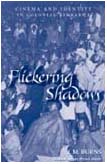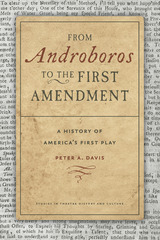2 books by Davis, Peter

Flickering Shadows
Cinema and Identity in Colonial Zimbabwe
J. M. Burns
Ohio University Press, 2002
Every European power in Africa made motion pictures for its subjects, but no state invested as heavily in these films, and expected as much from them, as the British colony of Southern Rhodesia. Flickering Shadows is the first book to explore this little-known world of colonial cinema. J. M. Burns pieces together the history of the cinema in Rhodesia, examining film production, audience reception, and state censorship, to reconstruct the story of how Africans in one nation became consumers of motion pictures. Movies were a valued “tool of empire” designed to assimilate Africans into a new colonial order. Inspired by an inflated confidence in the medium, Rhodesian government offcials created an African Film industry that was unprecedented in its size and scope. Transforming the lives of their subjects through cinema proved more complicated than white officials had anticipated. Although Africans embraced the medium with enthusiasm, they expressed critical opinions and demonstrated decided tastes that left colonial officials puzzled and alarmed. Flickering Shadows tells the fascinating story of how motion pictures were introduced and negotiated in a colonial setting. In doing so, it casts light on the history of the globalization of the cinema. This work is based on interviews with white and black filmmakers and African audience members, extensive archival research in Africa and England, and viewings of scores of colonial films.
[more]

From Androboros to the First Amendment
A History of America's First Play
Peter A. Davis
University of Iowa Press, 2015
The story of America’s earliest extant play begins with a petty crime—a crime that would have passed largely unnoticed had it not been for one fact: it prompted a beleaguered royal governor of one of Britain’s colonies to lash out at his enemies by writing a biting satire. Androboros, A Bographical [sic] Farce in Three Acts (1715), is universally acknowledged as the first play both written and printed in America. Its significance stems not simply from its publication but from its eventual impact. The play inadvertently laid the foundation for one of the defining rights of the nation that would eventually emerge some seventy-five years later—the First Amendment of the Constitution of the United States, guaranteeing a free press and freedom of expression.
Androboros was not just the first of its kind, it was also ahead of its time in many ways, preceding the harsh political satires and farces of the later eighteenth century by some fifty years. Such plays served a small but essential role in promoting political thought among the colonists. Written by anonymous authors and passed from hand to hand, these short, crude, and often bawdy plays and dialogues were rarely acted due to their inflammatory lampoonery. Nevertheless, they provided an opportunity for disgruntled colonists to vent their grievances and promote their ideas to fellow citizens. The farces of the late eighteenth century drove home the meaning and message of the American Revolution.
Equally significant is that Androboros may have influenced a few of the key political discourses published in the 1730s, and these works in turn may well have shaped the future of the American political landscape for the next several decades and even into the modern era. But as a closet drama intended only to be read by close friends and political supporters, this play has languished as a minor footnote in American intellectual history. Scholarly research published to date has been, for the most part, inadequate and occasionally inaccurate. This study remedies that oversight, providing a full analysis as well as an annotated typescript and facsimiles of the original printing.
Androboros was not just the first of its kind, it was also ahead of its time in many ways, preceding the harsh political satires and farces of the later eighteenth century by some fifty years. Such plays served a small but essential role in promoting political thought among the colonists. Written by anonymous authors and passed from hand to hand, these short, crude, and often bawdy plays and dialogues were rarely acted due to their inflammatory lampoonery. Nevertheless, they provided an opportunity for disgruntled colonists to vent their grievances and promote their ideas to fellow citizens. The farces of the late eighteenth century drove home the meaning and message of the American Revolution.
Equally significant is that Androboros may have influenced a few of the key political discourses published in the 1730s, and these works in turn may well have shaped the future of the American political landscape for the next several decades and even into the modern era. But as a closet drama intended only to be read by close friends and political supporters, this play has languished as a minor footnote in American intellectual history. Scholarly research published to date has been, for the most part, inadequate and occasionally inaccurate. This study remedies that oversight, providing a full analysis as well as an annotated typescript and facsimiles of the original printing.
[more]
READERS
Browse our collection.
PUBLISHERS
See BiblioVault's publisher services.
STUDENT SERVICES
Files for college accessibility offices.
UChicago Accessibility Resources
home | accessibility | search | about | contact us
BiblioVault ® 2001 - 2024
The University of Chicago Press









